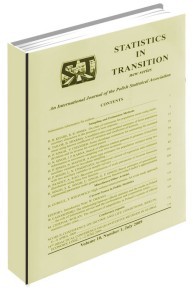SUBJECTIVE APPROACH TO ASSESSING POVERTY IN POLAND – IMPLICATIONS FOR SOCIAL POLICY
SUBJECTIVE APPROACH TO ASSESSING POVERTY IN POLAND – IMPLICATIONS FOR SOCIAL POLICY
Author(s): Leszek Morawski, Adrian DomitrzSubject(s): Economy, National Economy, Micro-Economics, Public Finances, Socio-Economic Research
Published by: Główny Urząd Statystyczny
Keywords: subjective poverty; household equivalence scale; social policy
Summary/Abstract: The poverty rates based on the OECD scales are frequently used in public debate. In this scale, large families are usually identified as those most in need of financial support. Poland is an interesting case for applying an alternative, subjective approach to calculating equivalent scales, as Poland has a large mean size for households, and is dependent on means-testing in social policymaking. The overall poverty rates for the two approaches are not distinctly different but they lead to significantly different distributions of poverty, as different types of households are considered in line with the result in Bishop et al. (2014) for the eurozone countries. The subjective approach suggests that one-person households, not large families, should be considered most at risk of material poverty. Futhermore, the relative positions of households in the income distributions also differ considerably. As a consequence, the current shape of social policy in Poland may need to be reconsidered in order to distribute public transfers more accurately.
Journal: Statistics in Transition. New Series
- Issue Year: 18/2017
- Issue No: 3
- Page Range: 501-520
- Page Count: 20
- Language: English

